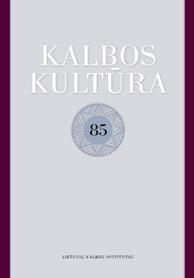Svetimžodžio aftepartis atitikmenų vertinimas interneto komentaruose
Evaluation of the equivalents of the loanword aftepartis in the comments of the internet community
Author(s): Daiva MackoSubject(s): Baltic Languages
Published by: Lietuvių Kalbos Institutas
Keywords: equivalent; linguistic attitudes; dissemination of norms; loanword;
Summary/Abstract: The paper deals with readers’ comments on the article “Afterpartis”: dūzgės, povakaris ar pratęstuvės?“ published on the internet news portal “DELFI” on 8 April 2011. An attempt is made to establish the criteria on which the evaluations of the Lithuanian equivalents of the loanword aftepartis (afterparty) are based. In addition, the general linguistic attitudes of society towards the codification of loanwords are overviewed.The reviewed comments were divided into groups according to their subject: evaluation of loanwords, evaluation of the Lithuanian equivalents of aftepartis, and proposals for other equivalents. Analysis of the general loanword evaluation shows that the communicative function of language is most valuable for many language users, while the conceptions of an international word and a loanword and their limits are the most problematic. Although the majority of the participants of this discussion think negatively of language codification their criticism shows that on the one hand language users are not indifferent to language codification, yet on the other hand they lack information about language norms, yet their implementation.The research established that the Lithuanian equivalents of aftepartis were evaluated thoroughly by the readers – semantic content, easiness of derivation and functionality were taken into consideration as well as the probability of entering usage. The researched comments lead to the conclusion that the internet community considered the criteria of systematicity, derivability and adequacy of meaning and did not apply the criteria of linguistic correctness. It appears that readers tend to find derivational relations between words intuitively and apply them creatively when using new equivalents of loanwords. There is a probability that society would take language norms and codification criteria into consideration more if it had more information about them. This is confirmed by the numerous examples of the usage applications of the new equivalents provided by the readers as well as by the wish of language users to participate in language standartization activities as revealed by the discussion.
Journal: Bendrinė kalba (iki 2014 metų – Kalbos kultūra)
- Issue Year: 2012
- Issue No: 85
- Page Range: 136-154
- Page Count: 19
- Language: Lithuanian

